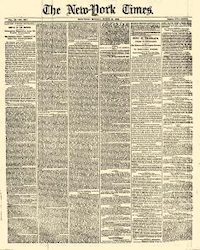The New York Times, July 25, 1860
As long as there was a reasonable chance that the one section or other of the Democratic Party would be able to place its candidate in the White House, or that an arrangement could be effected for concerted or harmonious action at the polls, Disunion was never named in Democratic councils. In fact, six weeks ago it was impossible to find a disunionist anywhere. All the fire-eaters denied that they had ever dreamed of such a thing. WISE had “folded his pale hands” as meekly as if he had never expressed the smallest thirst for a campaign against the Yankees and the British Abolitionists. YANCEY was almost as ardent in his devotion to the Union as EDWARD EVERETT, and TOOMBS was silent, the strongest evidence of pacific intentions which TOOMBS has ever afforded. More wonderful still, the Northern Democrats, for the first time in two years, had ceased to express any apprehensions with regard to the safety of the Government. They were evidently reveling in the novel sensation of confidence, or rather of absence of terror, and were lulled into the foolish, fond belief that ruin was not impending over them. Drygoods began to flow in freely, and the jobbers got so saucy and defiant that some of them were actually heard to speak disrespectfully of HAMBLETON, of the Confederacy, and declare that the next time he came round for his blackmail they would snap their fingers in his face. Even the real estate men, whom dissolution would affect most seriously, have been for a month or two unusually calm.
But unfortunately it has recently become quite apparent that a Democratic fusion is impossible, and that without a fusion a Republican triumph is certain; so the tocsin has been once more sounded, and as a last resource the dogs of war have been set to bay at us.
KEITT has been the first to raise his howl, and the Herald has taken up the cry, and before a week we shall have the whole pack giving tongue beautifully. The rival claims of DOUGLAS and BRECKINRIDGE have sunk into utter insignificance. Squatter Sovereignty is a relic of the past. Federal protection for “slave property” in the Territories is no longer wanted. The whole South is going to unite for a dissolution of the Union, pure and simple. The Republicans are earnestly requested not to give themselves the trouble of running a candidate, as nothing is so certain as that, if elected, he will never be inaugurated President of the United States!
Northern men, having been clearly proved by Mr. KEITT, by means of a Latin quotation from HARPER’s School Sallust, to be unequal to “the higher reaches of government,” all stockholders and real estate owners have been accordingly warned to sell out as quickly as possible, and prepare for the coming storm. If a sufficient number of imbeciles can be found amongst the bankers and merchants of the large cities of the North who will be sufficiently terrified by the uproar, to contribute handsomely for the purchase of Pennsylvania and New-Jersey at the election in November, we admit it will not have been made in vain; and we give the alarmists credit for a great deal too much shrewdness to suppose that they really have any other object in view. We have never supposed even the noisiest of the fire-eaters to be born fools. They are led into these ridiculous demonstrations simply by taking the Northerners for fools. There is not a man of them who would not turn pale as a ghost, if he were well assured that next November, Mason & Dixon’s line would become the dividing line between a Northern and Southern Republic.
As CASSIUS CLAY assured his audience the other day, at Louisville, any such event would be the direst calamity that could befall the slave-holders. The very charges of aggressiveness against Slavery, of secret designs in favor of emancipation, of negro-stealing and negro-corrupting, of dark and restless fanaticism, of meddlesomeness and intolerance, which now form the substance of the Southern indictment against the North, are the strongest reasons that could possibly be urged for Southern fear of dissolution. It is because the North is numerically superior—is aggressive—is fanatical in her opposition to Slavery—that the South should cling to the Constitution. It is the Union alone which keeps the Abolitionist railroad “underground,” instead of overground. It is the Constitution which converts the extreme Anti-Slavery men into talkers instead of actors, which causes all the fanatics to expend their enthusiasm in subscriptions, letters and speeches. If the Slave States were foreign territory, and neither our State Governments nor our State Courts were bound by any stronger obligations than those imposed by international law, to prevent armed forays across the border, armed forays would take place every week, and participation in them would become, in the eyes of a large portion of the population, if not a religious duty, at least a heroic exploit. The attempts of the authorities to prevent them would be as futile as those of the Sardinian Government to prevent the departure of recruits for GARIBALDI; and a few months of unredressed grievances, and of horrible alarm, would finally drive the South into a war in which she would share the invariable fate of the few when they contend with the many; of poor nations when they rise against rich ones; of houses which are divided against themselves, in the presence of united and determined enemies.
